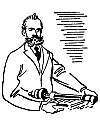 At the time Mergenthaler was working in Baltimore many people were
trying to invent some sort of typesetting machine. One of the early
efforts was that of Moore. His machine struck impressions on pieces of
paper with a typewriter. The paper was then cut into strips and used
much the same as type. A man by the name of Clephane helped finance
Moore but the project failed. Mergenthaler, although he had no
experience in printing, told Clephane he thought he could produce a
typesetting machine that would work.
At the time Mergenthaler was working in Baltimore many people were
trying to invent some sort of typesetting machine. One of the early
efforts was that of Moore. His machine struck impressions on pieces of
paper with a typewriter. The paper was then cut into strips and used
much the same as type. A man by the name of Clephane helped finance
Moore but the project failed. Mergenthaler, although he had no
experience in printing, told Clephane he thought he could produce a
typesetting machine that would work.Clephane agreed to finance him and then began the long years of cut and try for the young inventor. He started off much the same as Moore but made many mechanical changes. He tried typing on papier-mache and used this as a mold in which to cast the type - something like a waffle iron. But, as in the case of some waffles, the paper stuck to the hot metal and spoiled everything. By this time Mergenthaler was 30 years old and his problem was far from solved. The project looked like a failure, but inventors as I know from personal experience, can think fast in an emergency. It was perfectly evident to Mergenthaler that type was cast every day in regular metal type molds. Why not use these instead of paper? Why not set up individual metal type molds in a line and cast type a line at a time? At last he had these ideas built into a working model which he tried out in the composing room of the New York Tribune in July 1886 - ten years after he had first started to work on the idea. |








